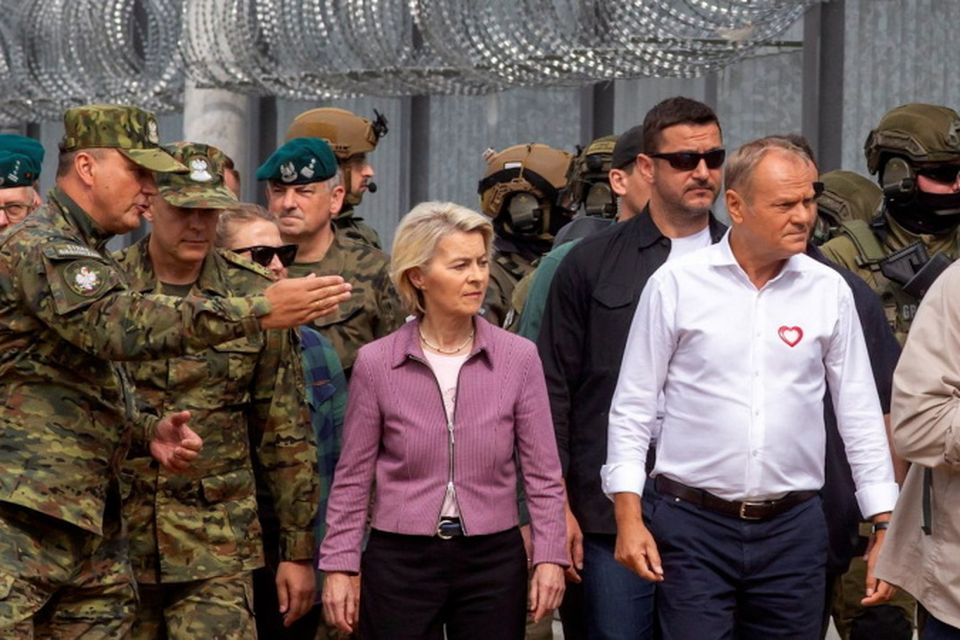Politics
Poland Accuses Russia of Drone Incursions Amid NATO Concerns

Poland has accused Russia of conducting drone incursions into its airspace, marking a significant escalation in tensions between the two nations. This accusation follows a series of incidents where Polish authorities reported multiple violations, raising alarms among NATO allies. Polish Prime Minister Donald Tusk stated that there had been as many as 19 intrusions recorded overnight, emphasizing the gravity of the situation.
In response to these allegations, the Russian Foreign Ministry dismissed the claims as “myths.” A spokesperson for the ministry indicated that Poland had provided no substantial evidence to support its assertions regarding the drone attacks. This dismissal aligns with a broader pattern of denial from Russia regarding its military activities in the region.
International Reactions Heighten Tensions
Germany’s Chancellor Friedrich Merz condemned the alleged drone incursions as “reckless,” underscoring the growing concern among European leaders about potential Russian aggression. Polish Foreign Minister Radosław Sikorski stated that the presence of drones in Polish airspace was not an accident, further intensifying the narrative of increasing threats from Russia.
The United Kingdom is reportedly evaluating options to enhance NATO air defense capabilities specifically over Poland. This move reflects the alliance’s commitment to collective security in the face of perceived threats. The situation has prompted discussions about the overall safety of NATO member states, with Lithuania’s foreign minister stressing that “no one in NATO is safe” from potential escalation of drone incidents.
Poland’s military response included shooting down Russian drones that violated its airspace, marking the first time NATO aircraft have engaged a potential threat in allied airspace. Such actions are viewed as a critical response to what many are calling an “extremely reckless” violation of sovereignty.
Broader Implications for NATO and Europe
The ongoing situation has been described by observers as the closest Poland has come to open conflict since World War II. Simon Harris, a prominent political figure, referred to the events as a “wake-up call for the West,” urging European nations to reassess their defense strategies in light of the evolving security landscape.
In a broader context, the Ukrainian region remains under continuous air raid alerts, further complicating the dynamics between NATO and Russia. The implications of the drone incursions extend beyond Poland, as European leaders grapple with the reality of a more aggressive stance from Russia.
As tensions continue to escalate, the conversations between Donald Trump and Polish officials scheduled for later this week are expected to focus on strengthening ties and addressing the security implications arising from these incidents. The discussions could pave the way for enhanced cooperation among NATO members as they confront the challenges posed by Russian military activities.
In conclusion, the drone incursions represent a significant flashpoint in EU-Russia relations, with the potential for far-reaching consequences across Europe and beyond. The situation remains fluid, and the international community is closely monitoring developments as both sides navigate this complex landscape of military posturing and diplomatic negotiations.
-

 Top Stories3 months ago
Top Stories3 months agoTributes Surge for 9-Year-Old Leon Briody After Cancer Battle
-

 Entertainment4 months ago
Entertainment4 months agoAimee Osbourne Joins Family for Emotional Tribute to Ozzy
-

 Politics4 months ago
Politics4 months agoDanny Healy-Rae Considers Complaint After Altercation with Garda
-

 Top Stories4 months ago
Top Stories4 months agoIreland Enjoys Summer Heat as Hurricane Erin Approaches Atlantic
-

 World5 months ago
World5 months agoHawaii Commemorates 80 Years Since Hiroshima Bombing with Ceremony
-

 Top Stories3 months ago
Top Stories3 months agoNewcastle West Woman Patricia Foley Found Safe After Urgent Search
-

 Top Stories5 months ago
Top Stories5 months agoFianna Fáil TDs Urgently Consider Maire Geoghegan-Quinn for Presidency
-

 World5 months ago
World5 months agoCouple Convicted of Murdering Two-Year-Old Grandson in Wales
-

 World5 months ago
World5 months agoGaza Aid Distribution Tragedy: 20 Killed Amid Ongoing Violence
-

 World5 months ago
World5 months agoAristocrat Constance Marten and Partner Convicted of Infant Murder
-

 Top Stories4 months ago
Top Stories4 months agoClimbing Errigal: A Must-Do Summer Adventure in Donegal
-

 Top Stories4 months ago
Top Stories4 months agoHike Donegal’s Errigal Mountain NOW for Unforgettable Summer Views









